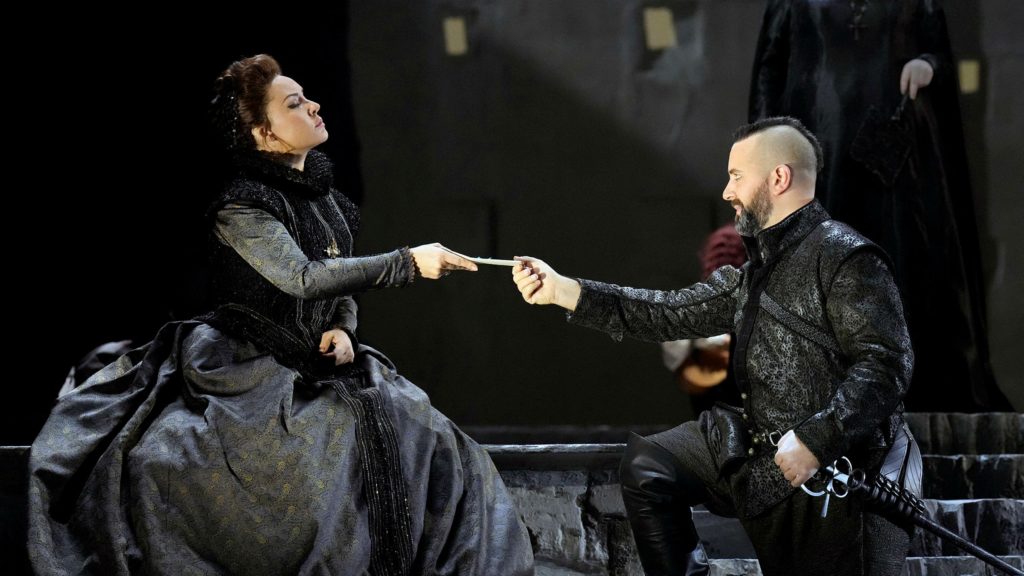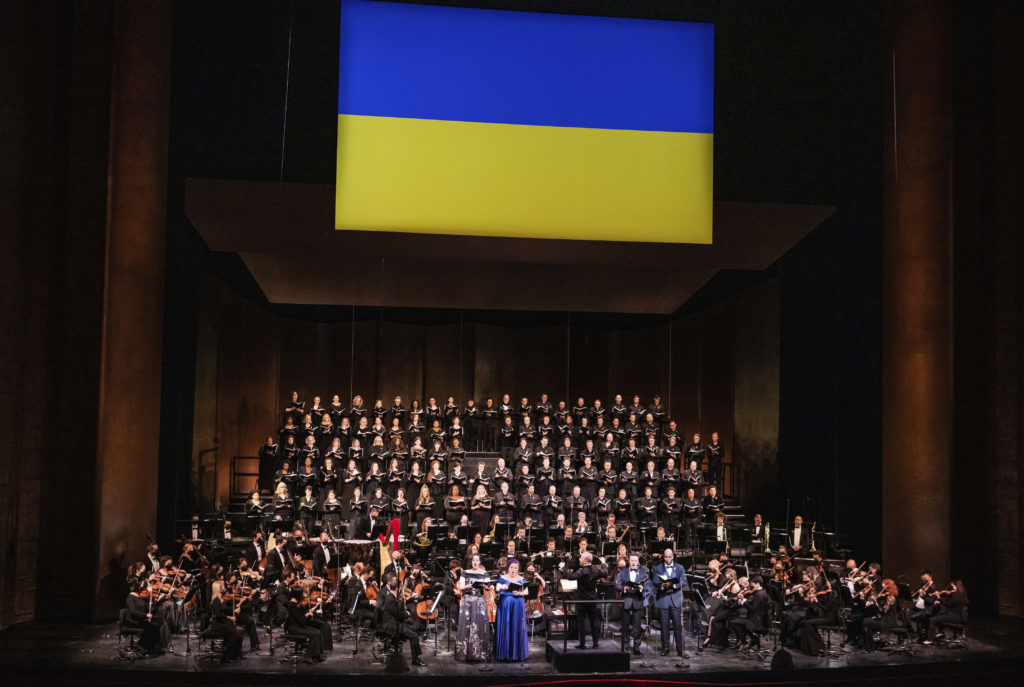VIEWPOINTS – Memorable nights at the opera: A dark, prescient new DON CARLOS and a succinct but moving CONCERT FOR UKRAINE
- By drediman
- March 16, 2022
- No Comments
Since returning to in-person performances this March (after a monthlong hiatus in February), the Metropolitan Opera’s programming has been on point. In addition to a heavenly revival of Richard Strauss’s rarely performed Ariadne auf Naxos starring a tremendous Lise Davidsen, the company also unveiled a powerful and prescient new production of Verdi’s Don Carlos and mounted a one-night-only concert in support of the Ukraine during this difficult time for the country. Read on below for my thoughts on these latter two memorable nights at the opera.

DON CARLOS
The Metropolitan Opera
In repertory through March 26
Met performances resumed this month with the premiere of a grim new production of Don Carlos (HIGHLY RECOMMENDED), which uses Verdi’s original five act version sung in French (which has never been performed by the company). Given all that’s been going on in the Ukraine, David McVicar’s dark, muscular production of the opera – which largely centers on the theme of the suppression of freedom by church and state – couldn’t be more timely. Don Carlos is opera at its most grand (including its length), and McVicar’s brooding, deliberately paced processional-like staging takes its time unearthing the opera’s many layers of plot and characters. Perhaps the most revelatory of these excavations is the love story between the title character (tenor Matthew Polenzani, never better) and the revolutionary Rodrigue (the compelling baritone Etienne Dupuis), a same-sex relationship that feels totally unforced and naturally at home within the context of the opera as originally written. The first run cast is astounding, both vocally and dramatically. Aside from Mr. Polenzani and Mr. Dupuis, memorable turns include bass-baritone Eric Owens as a convincingly stolid King of Spain, soprano Sonya Yoncheva as his conflicted but captivating queen, and the show-stopping mezzo-soprano Jamie Barton as the opera’s fiery “other woman”. But what distinguishes this production as a piece of music theater is the level of detail of their characterizations, which I can only attribute to the veteran director. Holding it all together is maestro Yannick Nézet-Séguin, who exquisitely shapes the score, richly highlighting its myriads of details without veering away from the opera’s slow-burning drama.

A CONCERT FOR UKRAINE
The Metropolitan Opera
Closed
Then this past Monday for one-night-only, the mighty opera company mounted A Concert for Ukraine (HIGHLY RECOMMENDED), a succinct but deeply moving concert comprised of classical music staples in support of the Ukraine and its citizens (all the proceeds and donations from the concert go to war relief efforts). Lasting just over an hour, the compact but well-curated performance – which was once again conducted by Yannick Nézet-Séguin (is there a busier, more dedicated person in classical music right now?) – commenced with the Ukranian national anthem, which was poignantly sung by bass-baritone Vladyslav Buialsky, who is Ukranian. Then came Valentin Silvestrov‘s haunting choral piece “Prayer for Ukraine” featuring an affectingly hushed Met Chorus. The evening continued with the Met Orchestra’s wrenchingly mournful rendition (even more so than usual) of the string-drenched Adagio for Strings by Samuel Barber. After that came a somber but proudly-sung “Va, Pensiero” from Verdi’s Nabucco, which has been hijacked as a sort of universal anthem for the downtrodden. Perhaps best of all was Richard Strauss’s Four Last Songs sung with gorgeous color and effortless power by soprano Lise Davidsen (who is currently giving, as mentioned above, a breathtaking vocal performance in Ariadne auf Naxox, also by Strauss). The evening concluded with the final “Ode to Joy” movement of Beethoven’s Ninth Symphony. Although maestro Nézet-Séguin had just conducted the Ninth with his fantastic Philadelphia Orchestra (where he is also music director), his take here was freshly urgent, ending the concert on a triumphant note. Indeed, the Met Chorus and the soloists shined brightly, particularly bass-baritone Ryan Speedo Green, whose voiced boomed with commanding authority.

 Copyright © 2024
Copyright © 2024
Leave a Reply